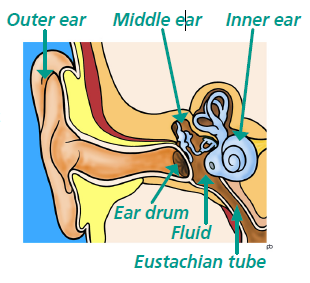The medical term for glue ear is:

Otitis Media with Effusion (OME)
It is fluid behind the ear drum, which blocks the middle ear.
It can be mild and can come and go by itself, or it can last
a long time and cause lots of problems.
If it is left untreated it can lead to hearing difficulties which can affect speech development.
All children born with a cleft palate are closely monitored for glue ear throughout their childhood.
Your child might….
- not answer when called;
- give the wrong answer to a question;
- find it harder to hear in noisy places, e.g. at nursery, in the park or in noisy traffic;
- turn up the volume on the TV;
- show delayed language development or have unclear speech;
- become tired or frustrated easily;
- not concentrate well;
- prefer to play alone;
- have recurrent ear infections.
BUT…..
Sometimes there are no obvious problems or warning signs and the glue ear is picked up at a routine hearing test.
- Reduce any background noise.
- Be face to face as much as possible and make sure your child looks at you.
- Slow down your speech so that your child has extra time to tune in.
- Get your child’s attention before you speak to them by calling their name or touching
them gently. - If your child says something inaccurately, repeat it back to them clearly rather than
correcting them. - Give your child lots of nonverbal clues such as pointing and gesture.
- At school, it will help to sit nearer the teacher in the classroom. Small group work and quiet corners are also helpful.
What should I do if I am worried about my child’s hearing?
- Contact your local Ear, Nose and Throat (ENT) Department.
- Talk to your child’s Speech and Language Therapist.
- Talk to your child’s teachers so that they can find the best ways
to help your child in school.
Useful resources
Websites
CLAPA (Cleft Lip and Palate Association)
https://www.clapa.com/
Clips on YouTube
‘Flintstones hearing loss’ video.
https://www.youtube.com/watch?v=zHWZ-iBhz-4